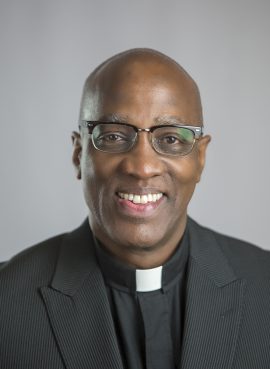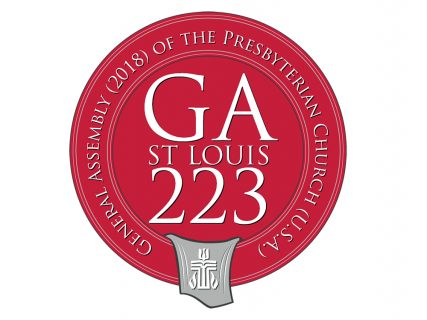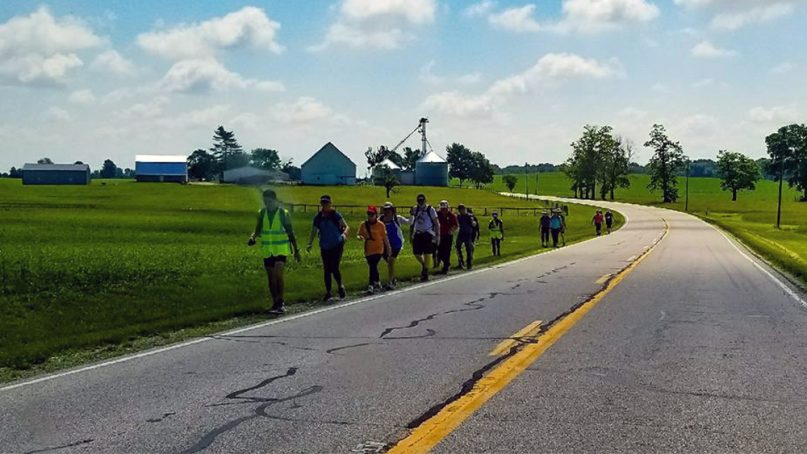(RNS) — As the Presbyterian Church (USA) prepares for its biennial General Assembly in St. Louis beginning Saturday (June 16), many PCUSA leaders are hoping to address several contentious issues during the weeklong meeting — and to bring reform to the dwindling mainline Protestant denomination.
Items before the assembly include divestment from fossil fuels, a number of resolutions regarding the Middle East, longer parental leave for PCUSA employees and new ways to ordain leaders of immigrant congregations.
Immigration also is “sure to be addressed at the Assembly,” according to a post on the PCUSA website. Recent meetings of both the U.S. Conference of Catholic Bishops and Southern Baptist Convention have addressed the Trump administration’s immigration policies, and Cindy Kohlmann of the Presbytery of Boston, who is in the running for co-moderator of the assembly, tweeted there was talk of proposing a resolution calling on the U.S. Department of Justice to stop separating children from their families at the U.S.-Mexico border.
RELATED: Presbyterians vote to continue pressure on Israel
All this comes as the denomination — one of the 10 largest Protestant denominations in the U.S., according to Pew’s most recent Religious Landscape Study — continues to lose members.
“What I believe we are encountering now is another reformation — a reformation within the 21st-century church to be just that: a 21st-century church,” General Assembly Stated Clerk J. Herbert Nelson II said.
The PCUSA lost nearly 68,000 members between 2016 and 2017, according to its website, putting its total membership at 1.4 million. That decline is a slowdown from the denomination’s “unprecedented” losses between 2012 and 2016, when churches and their members left the PCUSA after previous assemblies voted to ordain LGBT clergy and allow same-sex marriage.

J. Herbert Nelson II. Photo courtesy of PCUSA
Nelson said he’s seeing renewed excitement in the denomination as more people become interested in the issues of justice the denomination has always embraced, from young people to grandparents getting involved for the first time.
“We as a denomination, along with other Protestant mainline denominations, have been losing numbers since probably the 1970s,” he said. “That trend is what we are looking at in attempting to be a turnaround denomination at this point. One of the great challenges, I think, is moving from an institutional culture to a movement culture.”
Nelson said he hopes to turn the General Assembly into a “learning lab,” exploring what a 21st-century church might look like and how to take that back to local congregations.
That work started more than a year ago, sending Presbyterians from across the country to volunteer with groups working in St. Louis, he said. Liz Theoharis, a PCUSA minister and co-chair of the Poor People’s Campaign, will speak Saturday at a pre-assembly event. The meeting will adjourn Tuesday afternoon so delegates can march to the City Justice Center, donating the offering collected at opening worship to bail out people incarcerated for minor offenses.
Nelson said he knows there are some within the denomination “who struggle with this type of faith approach and view it as aggressive, so I don’t want to paint a rosy picture that there’s no opposition to it.”
“But somehow or another the Lord has given us an opportunity to press on anyway, and we only will see and know what the outcome will be when we continue to walk by faith and not by sight.”
Middle East issues
One of eight resolutions (called overtures) regarding Israel and the occupied Palestinian territories before the General Assembly’s Committee on Middle East Issues opposes anti-BDS (Boycott, Divestment, Sanctions) legislation by Congress and state governments, pointing to the freedom of speech. Others include examining a call for “ecumenical solidarity” by the National Coalition of Christian Organizations in Palestine, having dialogue with Jewish colleagues “engaging the issue of the Israeli occupation of Palestine” and developing policy recommendations on the status of Jerusalem.

Logo for the 223rd General Assembly of the Presbyterian Church (USA), to be held in St. Louis in June 2018. Image courtesy of PCUSA
That comes after delegates to the 2014 General Assembly narrowly voted to divest church funds from three American companies it said were profiting from the oppression of Palestinians within Israel’s occupied territories.
“Our stance is a stance for human rights across the board, across the world,” said the Rev. Jeffrey DeYoe, moderator of the denomination’s Israel/Palestine Mission Network.
But not everybody sees it the same way. Rabbi Noam Marans, director of interreligious and intergroup relations for the American Jewish Committee, told RNS the committee has had a presence at the General Assembly since 2012. It won’t this year.
In a written statement, Marans said, “The sheer volume of anti-Israel resolutions discussed and debated reveals a deep animus that needs to be called out.”
Fossil fuels
Divestment from companies heavily involved in the fossil fuel industry is back on the agenda for the third straight General Assembly, the subject of several resolutions and the PCUSA Walk for a Fossil Free World organized by the Presbyterian Peace Fellowship and Fossil Free PCUSA.
“We needed to come into this General Assembly in a much different way, in a much different space, and, frankly, I needed more spiritual grounding,” said the Rev. Abby Mohaupt, moderator of Fossil Free PCUSA.
“I thought a pilgrimage might be the way to do it.”
That’s why Mohaupt and about 35 others between the ages of 16 and 67 decided to walk to the General Assembly in St. Louis — many of them beginning June 1 at the mainline Protestant denomination’s headquarters, some 260 miles away in Louisville, Ky.
Along the way, they’ve walked along back roads and highways; slept in PCUSA churches and one Southern Baptist church; found shelter from a storm at a house with an array of solar panels; suffered through poison ivy, sunburn and blisters; prayed the Liturgy of the Hours; sung songs written for the occasion; and heard from people who have been directly impacted by climate change — including Native Alaskans, Nigerians and Puerto Ricans. Light days are 10 miles of walking. The longest has been 19, Mohaupt said.
On Monday, walkers shrieked as they passed the 150-mile mark.
“You walk 150 miles and you lose your mind,” Mohaupt said, laughing, in a call from the road with Religion News Service, screams and traffic sounding in the background.

Participants in the PCUSA Walk for a Fossil Free World make their way along country highways in the Midwest. Photo courtesy of Fossil Free PCUSA
The walkers are hoping to change the conversation as the assembly considers ending its business with fossil fuels — a hot topic at the past two meetings, with the 2016 assembly voting to continue to engage energy companies for at least two more years.
That’s still the most effective way to pressure companies to move away from fossil fuels, according to several groups, including the Advisory Committee on Social Witness Policy for the General Assembly. And there has been some movement from companies, said Steven Webb, co-chair of the committee.
“We fully agree with the Fossil Free PCUSA group and others saying climate change is a very important issue, and we totally agree with that and appreciate their efforts to highlight that issue. The question is what’s the best strategy to make some changes happen,” Webb said.
An overture by the Presbytery of Hudson River this year is asking the denomination and its board of pensions to divest from the fossil fuel industry and invest in companies focused on renewable energy or energy efficiency instead. Another, from the Presbytery of East Tennessee, listed criteria that would cause the denomination to “selectively divest” from companies.
To Mohaupt, who has been walking the past two weeks to draw attention to the cause, that would send a message to the people whose stories walkers have been hearing all week, whose communities have been destroyed by land grabs, melting ice and hurricanes exacerbated by climate change and dependence on fossil fuels, she said.
“I really think this is the year we’re going to do it because of the groundswell of Presbyterian support and this walk and the conversations we’ve had with people,” she said.





